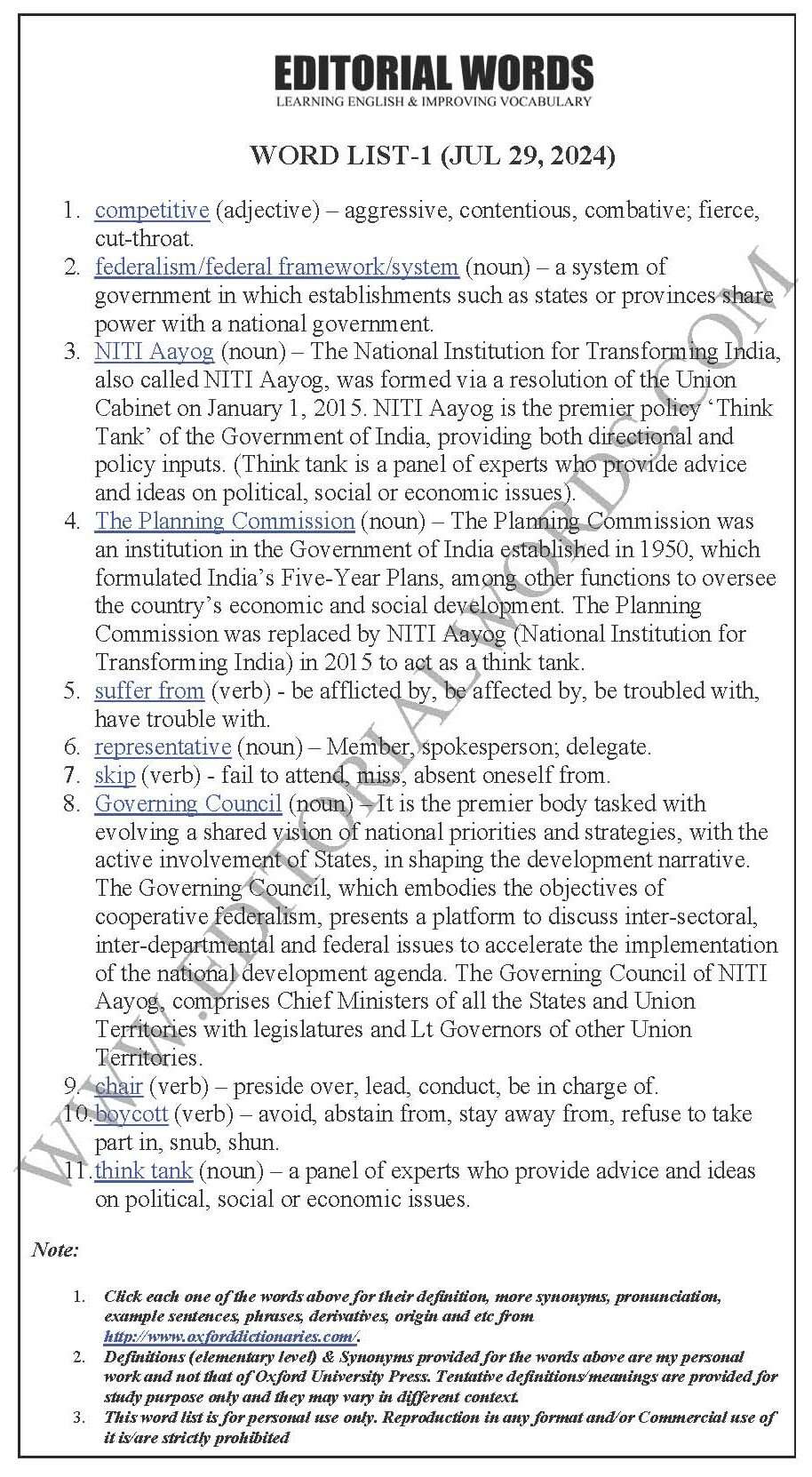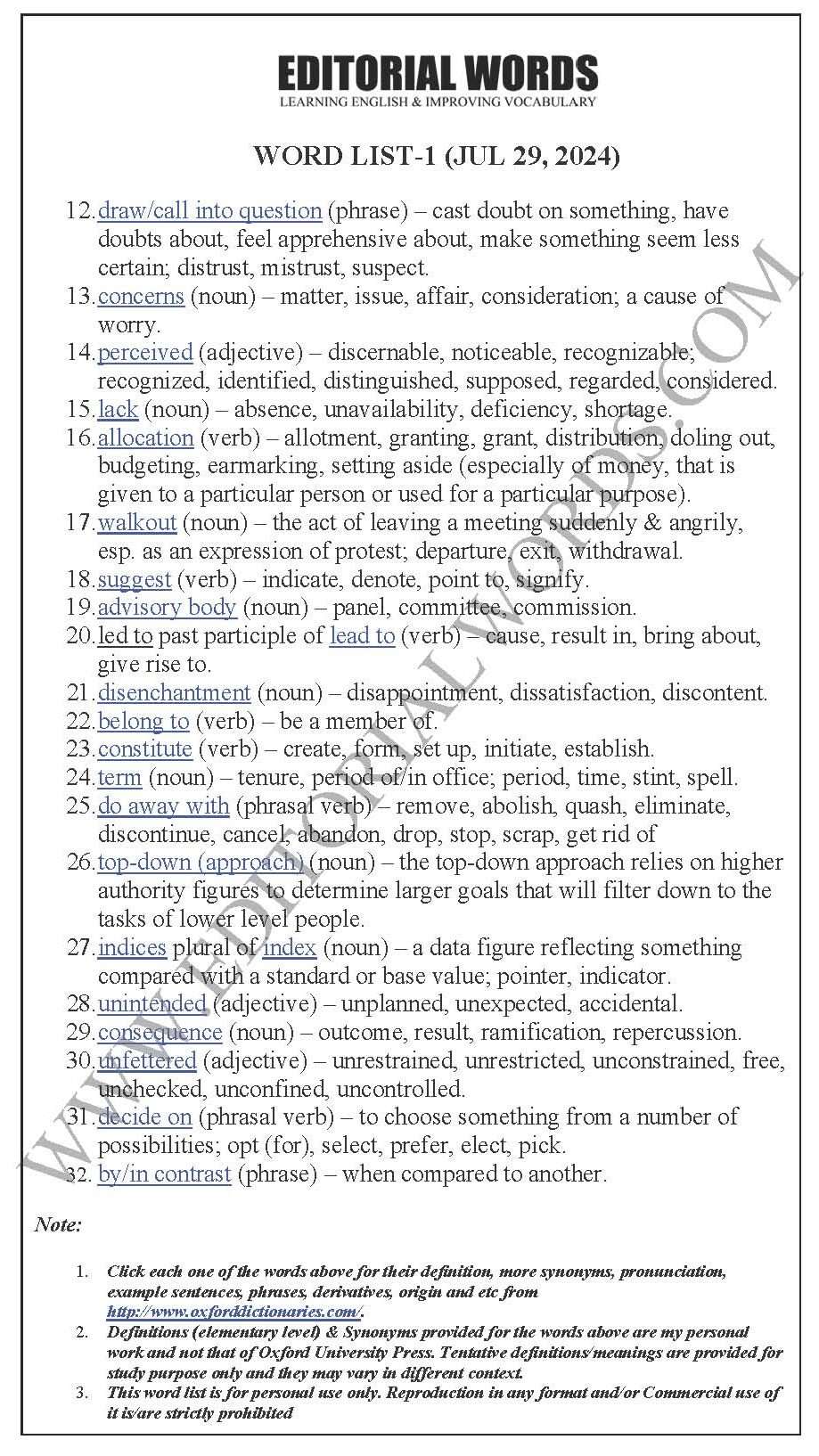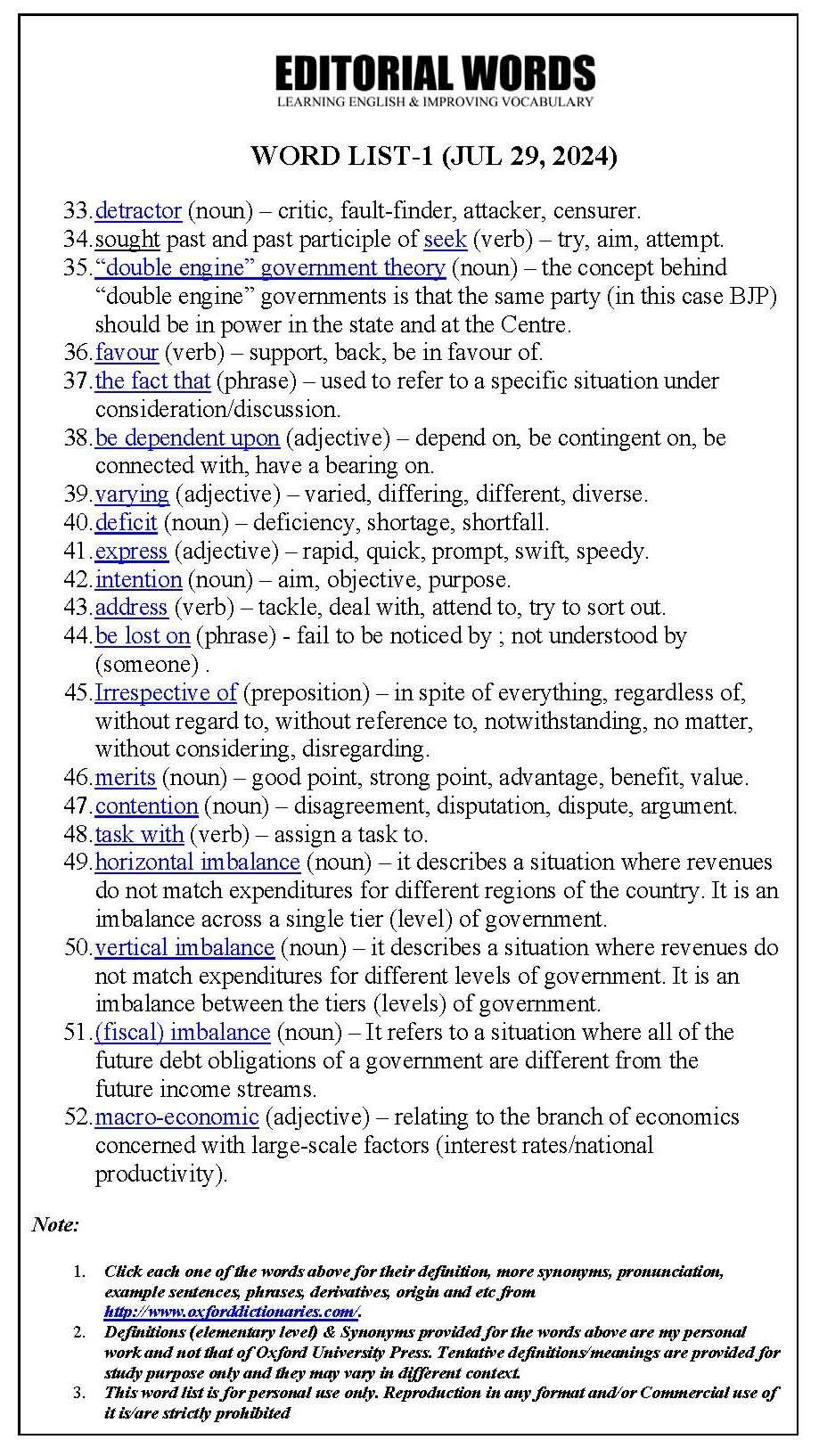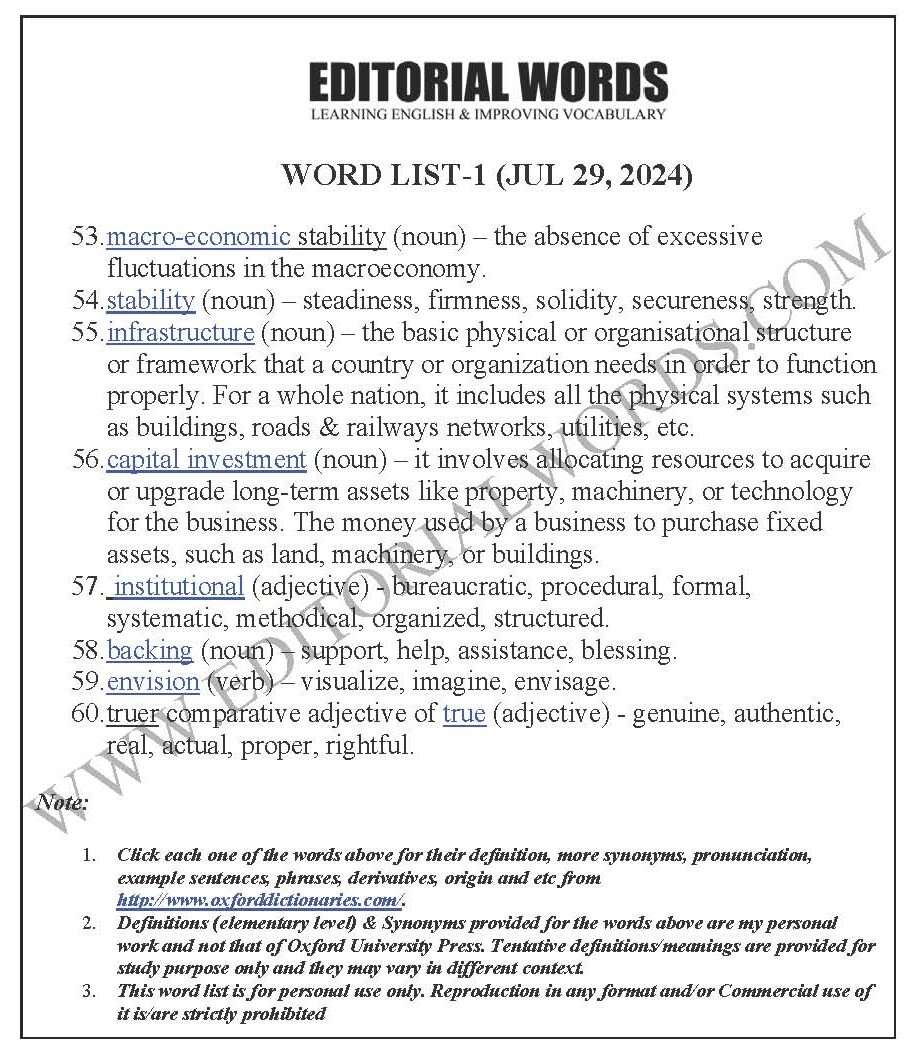The Hindu Editorial (Competitive federalism) – Jul 29, 2024
To read this article, click “The Hindu”.
This preview is provided here with permission.
Courtesy: The Hindu
The Hindu Editorial (Competitive federalism) – Jul 29, 2024:
- competitive (adjective) – aggressive, contentious, combative; fierce, cut-throat.
- federalism/federal framework/system (noun) – a system of government in which establishments such as states or provinces share power with a national government.
- NITI Aayog (noun) – The National Institution for Transforming India, also called NITI Aayog, was formed via a resolution of the Union Cabinet on January 1, 2015. NITI Aayog is the premier policy ‘Think Tank’ of the Government of India, providing both directional and policy inputs. (Think tank is a panel of experts who provide advice and ideas on political, social or economic issues).
- The Planning Commission (noun) – The Planning Commission was an institution in the Government of India established in 1950, which formulated India’s Five-Year Plans, among other functions to oversee the country’s economic and social development. The Planning Commission was replaced by NITI Aayog (National Institution for Transforming India) in 2015 to act as a think tank.
- suffer from (verb) – be afflicted by, be affected by, be troubled with, have trouble with.
- representative (noun) – Member, spokesperson; delegate.
- skip (verb) – fail to attend, miss, absent oneself from.
- Governing Council (noun) – It is the premier body tasked with evolving a shared vision of national priorities and strategies, with the active involvement of States, in shaping the development narrative. The Governing Council, which embodies the objectives of cooperative federalism, presents a platform to discuss inter-sectoral, inter-departmental and federal issues to accelerate the implementation of the national development agenda. The Governing Council of NITI Aayog, comprises Chief Ministers of all the States and Union Territories with legislatures and Lt Governors of other Union Territories.
- chair (verb) – preside over, lead, conduct, be in charge of.
- boycott (verb) – avoid, abstain from, stay away from, refuse to take part in, snub, shun.
- think tank (noun) – a panel of experts who provide advice and ideas on political, social or economic issues.
- draw/call into question (phrase) – cast doubt on something, have doubts about, feel apprehensive about, make something seem less certain; distrust, mistrust, suspect.
- concerns (noun) – matter, issue, affair, consideration; a cause of worry.
- perceived (adjective) – discernable, noticeable, recognizable; recognized, identified, distinguished, supposed, regarded, considered.
- lack (noun) – absence, unavailability, deficiency, shortage.
- allocation (verb) – allotment, granting, grant, distribution, doling out, budgeting, earmarking, setting aside (especially of money, that is given to a particular person or used for a particular purpose).
- walkout (noun) – the act of leaving a meeting suddenly & angrily, esp. as an expression of protest; departure, exit, withdrawal.
- suggest (verb) – indicate, denote, point to, signify.
- advisory body (noun) – panel, committee, commission.
- led to past participle of lead to (verb) – cause, result in, bring about, give rise to.
- disenchantment (noun) – disappointment, dissatisfaction, discontent.
- belong to (verb) – be a member of.
- constitute (verb) – create, form, set up, initiate, establish.
- term (noun) – tenure, period of/in office; period, time, stint, spell.
- do away with (phrasal verb) – remove, abolish, quash, eliminate, discontinue, cancel, abandon, drop, stop, scrap, get rid of
- top-down (approach) (noun) – the top-down approach relies on higher authority figures to determine larger goals that will filter down to the tasks of lower level people.
- indices plural of index (noun) – a data figure reflecting something compared with a standard or base value; pointer, indicator.
- unintended (adjective) – unplanned, unexpected, accidental.
- consequence (noun) – outcome, result, ramification, repercussion.
- unfettered (adjective) – unrestrained, unrestricted, unconstrained, free, unchecked, unconfined, uncontrolled.
- decide on (phrasal verb) – to choose something from a number of possibilities; opt (for), select, prefer, elect, pick.
- by/in contrast (phrase) – when compared to another.
- detractor (noun) – critic, fault-finder, attacker, censurer.
- sought past and past participle of seek (verb) – try, aim, attempt.
- “double engine” government theory (noun) – the concept behind “double engine” governments is that the same party (in this case BJP) should be in power in the state and at the Centre.
- favour (verb) – support, back, be in favour of.
- the fact that (phrase) – used to refer to a specific situation under consideration/discussion.
- be dependent upon (adjective) – depend on, be contingent on, be connected with, have a bearing on.
- varying (adjective) – varied, differing, different, diverse.
- deficit (noun) – deficiency, shortage, shortfall.
- express (adjective) – rapid, quick, prompt, swift, speedy.
- intention (noun) – aim, objective, purpose.
- address (verb) – tackle, deal with, attend to, try to sort out.
- be lost on (phrase) – fail to be noticed by ; not understood by (someone) .
- Irrespective of (preposition) – in spite of everything, regardless of, without regard to, without reference to, notwithstanding, no matter, without considering, disregarding.
- merits (noun) – good point, strong point, advantage, benefit, value.
- contention (noun) – disagreement, disputation, dispute, argument.
- task with (verb) – assign a task to.
- horizontal imbalance (noun) – it describes a situation where revenues do not match expenditures for different regions of the country. It is an imbalance across a single tier (level) of government.
- vertical imbalance (noun) – it describes a situation where revenues do not match expenditures for different levels of government. It is an imbalance between the tiers (levels) of government.
- (fiscal) imbalance (noun) – It refers to a situation where all of the future debt obligations of a government are different from the future income streams.
- macro-economic (adjective) – relating to the branch of economics concerned with large-scale factors (interest rates/national productivity).
- macro-economic stability (noun) – the absence of excessive fluctuations in the macroeconomy.
- stability (noun) – steadiness, firmness, solidity, secureness, strength.
- infrastructure (noun) – the basic physical or organisational structure or framework that a country or organization needs in order to function properly. For a whole nation, it includes all the physical systems such as buildings, roads & railways networks, utilities, etc.
- capital investment (noun) – it involves allocating resources to acquire or upgrade long-term assets like property, machinery, or technology for the business. The money used by a business to purchase fixed assets, such as land, machinery, or buildings.
- institutional (adjective) – bureaucratic, procedural, formal, systematic, methodical, organized, structured.
- backing (noun) – support, help, assistance, blessing.
- envision (verb) – visualize, imagine, envisage.
- truer comparative adjective of true (adjective) – genuine, authentic, real, actual, proper, rightful.
Note :
1. Click each one of the words above for their definition, more synonyms, pronunciation, example sentences, phrases, derivatives, origin and etc. from http://www.oxforddictionaries.com/.
2. Definitions (elementary level) & Synonyms provided for the words above are my personal work and not that of Oxford University Press. Tentative definitions/meanings are provided for study purposes only and they may vary in a different context.
3. This word list is for personal use only. Reproduction in any format and/or Commercial use of it is/are strictly prohibited.
The Hindu Editorial (Competitive federalism) – Jul 29, 2024:




“Phrasal Verbs” We Learnt Last Week
“Idioms & Phrases” We Learnt Last Week
“Important Definitions” We Learnt Last Week
Recent Word Lists For The Hindu Editorial Articles

With 10 State and Union Territory representatives skipping the ninth Governing Council meeting of the NITI Aayog chaired by Prime Minister Narendra Modi — seven of them boycotted it — the think tank’s role has been called into question… For further reading, visit “The Hindu”. Below is today’s word list-1 for The Hindu Editorial (Competitive federalism) – Jul 29, 2024.